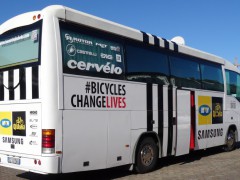Helping shape Africa’s future on two wheels: Team MTN-Qhubeka

As the MTN-Qhubeka cycling team embarks on the 3,360 kilometre long Tour de France route, they hope to give others the opportunity to complete ultimately much longer lasting journeys on two wheels.
This year, an African cycling team is competing in the Tour de France for the first time in the race’s history. However, unlike the other 21 teams participating in the 102nd edition of the event this year, the sponsorship arrangements behind Team MTN-Qhubeka are quite unique to professional cycling, and are driven by a distinctly different philosophy.
Cycling teams generally receive the majority of their income from corporate sponsors, who lend their name to the team in return for the provision of funding. However, unlike typical sponsorship agreements, although lending its name to the MTN-Qhubeka team, Qhubeka does not provide the team with any funding. Rather, it has formed a partnership with the team which allows it to utilise the exposure generated by the cycling team as a platform for its projects and initiatives.
Qhubeka is the South African branch of the World Bicycle Relief program, and derives its name from a Nguni word meaning “to move forward”. The organisation hopes to achieve this by mobilising individuals and communities through bicycles. It does this by providing bikes to people in exchange for doing work in the environment and local community, whether it be recycling waste, farming food, riding a bike to school, establishing bicycle-centred enterprises, or providing bicycle-facilitated mobile healthcare services. In this way, Qhubeka hopes to not only provide individuals and communities with a sustainable mode of transportation, but also promote health, education, sports development and ecological sustainability within those communities.
Improving access to education, particularly in rural areas, is one of Qhubeka’s primary aims. A significant problem facing students living in remote towns is the long distances they often have to travel to attend school. Qhubeka estimates that 11 million of the 17 million children in South Africa walk to school, with some students’ journeys taking over four hours. However, with a Qhubeka Buffalo Bicycle, the time it takes a child to commute to school can be reduced by up to 75 per cent, consequently encouraging higher rates of school attendance, and also allowing students to arrive at school less tired and better able to concentrate.

Team MTN-Qhubeka at the team presentation at the Antwerpen Scheldeprijs in 2015, along with the Qhubeka Buffalo bicycle.
Photo by Jérémy Günther-Heinz Jähnick, CC BY SA 3.0 via Wikimedia Commons.
Qhubeka’s bicycle distribution program has made significant progress since it began in 2005, with more than 51,000 bicycles being distributed over the past decade. And this is a crucial point – Qhubeka places emphasis on “distributing” as opposed to merely “handing out” bicycles, a distinction that the organisation’s founder Anthony Fitzhenry contends is crucial to promoting one of program’s most defining features: each recipient of the Qhubeka Buffalo Bicycle has earned his or her bicycle by undertaking work in the local community. The ethic behind this distribution model is also represented in the logo featured on the back of the MTN-Qhubeka team kit (pictured below), which symbolises giving a “hand up”, rather than a “hand out”.

The Team MTN-Qhubeka team jersey, displaying a logo featuring a “hand up”, which Qhubeka aims to provide. Photo by Bert de Boer, CC BY SA 3.0 via Wikimedia Commons.
Team MTN-Qhubeka Principal Douglas Ryder explains that it is this very philosophy that has attracted such a depth of talent to this Professional Continental cycling team. In the past, MTN-Qhubeka riders have even donated portions of their prize money towards Qhubeka’s projects, and this year, they are encouraging others to also give to the organisation. During the 102nd edition of the Tour de France, the team aims to raise enough money to provide 5,000 bicycles to children in Africa through their #BicyclesChangeLives website. Only one week into the Tour, they have already passed the halfway mark to achieving this goal.
Qhubeka recognises that a bicycle is not just a mode of transportation, but rather an engine for economic and cultural empowerment, and as the MTN-Qhubeka team embarks on the 3,360 kilometre long Tour de France route, they hope to give others the opportunity to complete ultimately much longer lasting journeys on two wheels.
Tags: Buffalo Bicycle, community work, cycling, Qhubeka, school attendance, South Africa, sustainable transportation, Team MTN-Qhubeka, Tour de France, World Bicycle Relief
